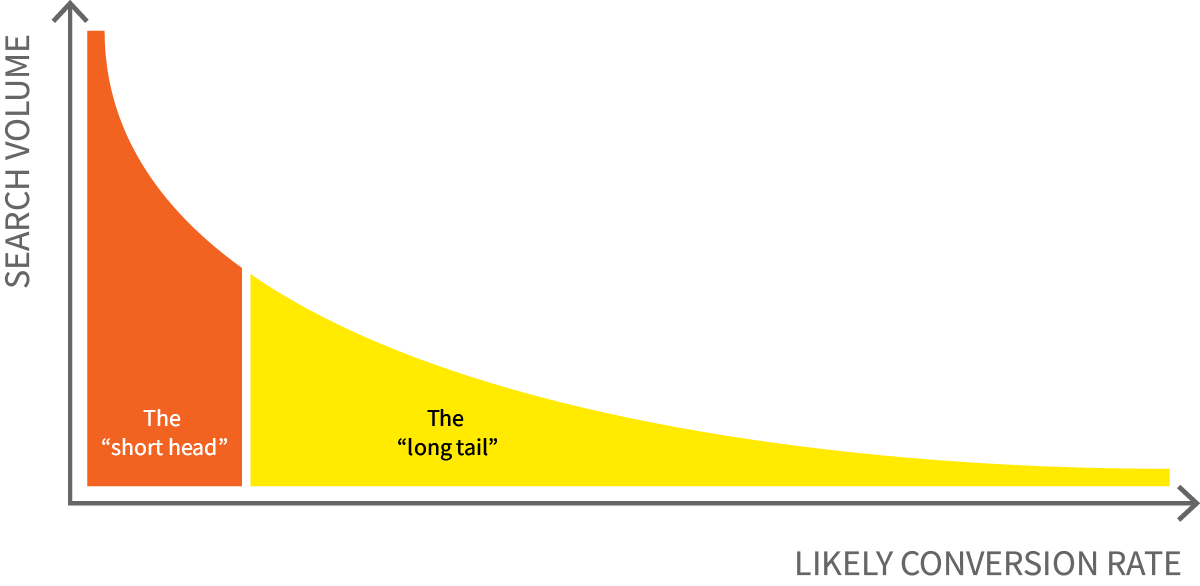
The importance of long tail keywords in a PPC campaign
What’s a long tail keyword?
Well, the vast majority of searches on Google involve one.
Loosely defined, it’s a search term that a user inputs to try and generate a more specific result, based on clearly defined parameters.
So something like
vegan restaurants in London SW6
as opposed to simply
London restaurants.
The reason they’re called ‘long tail’ isn’t actually to do with the length of the search query (typically between three and six words).
It’s because they’re found in the ‘tail’ of the diagram, as opposed to the ‘head’ where relatively few (albeit hugely popular) terms are.

So why does long tail matter for PPC?
One of the main drivers of any effective PPC campaign is knowing the best way to distribute your budget.
The way that PPC bids work means any attempts to target high volume single or two word terms can often be relatively expensive.
And of course, competition is much higher because advertisers tend to go to head terms as the obvious or default option. But more generic head terms can sometimes mean less precision and signify lower levels of buying intent from the searcher. This mix of high competition and low user intent can combine to make the cost per conversion expensive. And it can also lead to a low return on ad spend, particularly for websites designed to drive revenue rather than lead generation.
Which is where long tail comes in – aiming for lower volume terms (which have a more specific intent, often further along in the buying cycle).
These can ultimately provide a healthier return on investment if managed correctly.
So you can start to see your ads ranking well on highly targeted searches, even though you haven’t spent a premium.
But of course, success is reliant on research, which is why PPC consultants use specialist tools to uncover the most appropriate keywords.
One good place to start is the ‘Search Terms Report’ – also known as a ‘Search Query Report’ or (SQR) – from your existing Google Ads account.
This essential document shows the actual search terms users enter into Google to trigger your ads, as opposed to the keywords you’re bidding on.
Anyone managing a paid search campaign should regularly and methodically work through their SQRs.
This enables identification of both opportunities for improvement and areas of wastage, as an ongoing optimisation process.
Better targeting
Lower cost, lower competition – why else would you incorporate long tail keywords into your pay-per-click advertising?
As we’ve discussed, the level of user intent is key – a long tail searcher is making their intention more explicitly known.
Consider a search for:
Bikes
Do they want to buy a bike, sell a bike, look at pictures of different types of bikes – it’s virtually impossible to tell.
But what about:
Adult mountain bikes nearly new near me
Now this looks like a search by someone who is ready to buy or at least make an enquiry – which makes them easier to target with a relevant ad.
Long tail for SEO
Any research conducted by your PPC consultant will turn up a useful list of relevant long tail keywords.
And there’s no reason you can’t target these as part of your wider organic SEO strategy, alongside your paid search efforts.
Not all long tail queries will necessarily be related to imminent transactions or conversions – but may still offer opportunities.
Often, a long tail search is a quest for the best answer – so you can dedicate resource to creating content that provides precisely that.
You’ll likely find your relevant traffic increases – not necessarily in huge numbers but users that will engage with and share your content.
And if your content really scratches that long tail itch, you may even see yourself gain that sought after featured snippet spot in the SERPs.
Ready to get going with long tail targeting?
Building PPC adverts to take advantage of opportunities presented by long tail keywords is worthwhile but takes time to get right.
To incorporate them into your wider paid search strategy, choose a partner that will support you in getting the most out of your budget.
Get in touch today, or if you know someone who might be interested, share this content and spread the love.
Photo by Thomas Lipke on Unsplash
-
 30.06.2021|Learn how to bid on PPC advert keywords and create ads that convert - and stop wasted ad spend by using best practice or, better still, getting support.
30.06.2021|Learn how to bid on PPC advert keywords and create ads that convert - and stop wasted ad spend by using best practice or, better still, getting support. -
 12.08.2021|Establish and track the right KPIs for your PPC campaigns. Avoid mistakes many businesses make and improve your ROI with focused strategy.
12.08.2021|Establish and track the right KPIs for your PPC campaigns. Avoid mistakes many businesses make and improve your ROI with focused strategy. -
 23.07.2021|PPC attribution models tell you which ads & keywords make your customers click. Find out which is best for you.
23.07.2021|PPC attribution models tell you which ads & keywords make your customers click. Find out which is best for you.
Scrapbook
We have a lot to talk about.Door4 opinions and insight - exploring performance marketing, communications and optimisation.













